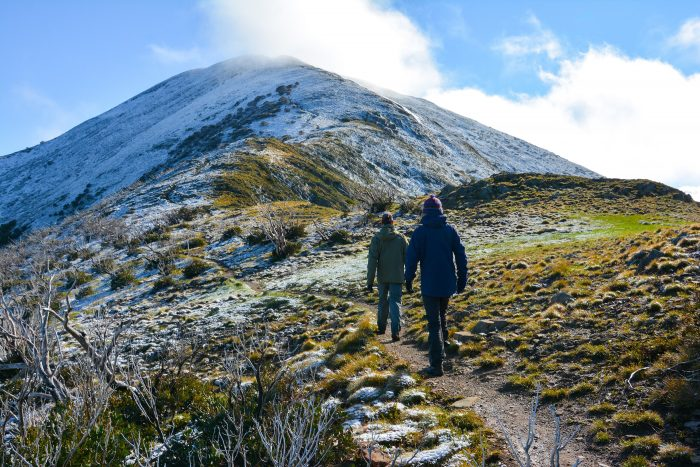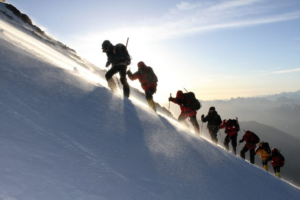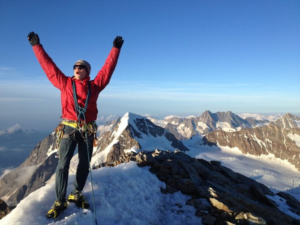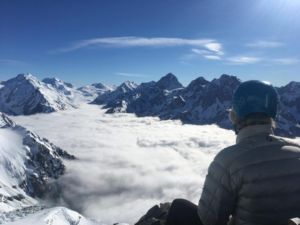
01 Mar The Benefits of an Adventurous Mindset
Having an adventurous mindset won’t stop you being an arsehole, but it could help. I could tell you how fitness and adventure will help you be a fantastic, well-balanced, kind, thoughtful, brave and fearless person…. but it would be bullshit. Just because you’re into the outdoors and physically and mentally challenging yourself doesn’t mean you create a Zen-like aura around you…. unless you work at it. I’ve seen people out in the mountains who are unpleasant human beings, solely focused on their own little world and not really giving a stuff about where they are, who they are with or who has helped them to get there.
Look, I admit it. I’m “neg’ing” out a bit. Most people who seek out the outdoors see it as a place of beauty, growth and challenge, a place of respect for greater powers and forces, and tend to have a pretty good attitude to life…. I’m just saying it’s NOT guaranteed, so don’t take it for granted!
“The purpose of life is to live it, to taste experience to the utmost, to reach out eagerly and without fear for newer and richer experience.”
– Eleanor Roosevelt
If you open your mind and are willing to learn, to challenge yourself, to look on in wonder at what Mother Nature has to offer and learn from cultural differences then you may realise that you can create a life of lasting change and growth. Yes, you will come across people every now and then, box tickers with a “Done that!” mentality. It is okay to be proud of your achievements but make sure you take the time to really think about what that achievement means, what it took to get there and who helped to make it happen. Those people that don’t are missing the point and missing so much.
A great exercise to develop your sense of adventure and your personal growth around it is when you accept a physical challenge have a think, even write down, what does success mean to you? Even better, write down what the journey means to you, whether you succeed or not. When you acknowledge what you will learn from the journey you always succeed no matter what the outcome.
Personal Growth
You see, challenging adventure goals can help with growing your self-confidence, personal resourcefulness, resilience and self-esteem. Resilience is defined as the capacity to recover quickly from difficulties, from toughness. If you know you’ve dug deep to finish an event or climb a mountain or get to Everest Basecamp you can transfer that resolve to everyday life – you can cope with the knocks and the grind, and you can do what is required because you know you’ve done it before.
Your personal growth will also increase exponentially if you see the crossover between your adventurous life and your normal life (work, relationships, etc.) For example, seeing “life as an adventure” and the challenging physical aspect of that as an extension, a tool to learn your own ability to get the most out of life.
To show what I mean, let’s turn to some really interesting research in this field.

Resilience
One study saw two student groups on a tall ship voyage in New Zealand, with a control group who stayed in university doing a psychology course. Study 1 revealed that voyage participants experienced increased resilience over the course of the voyage. Study 2 sought to replicate and extend these findings by assessing the extent to which increased resilience was maintained five months following the voyage and was associated with other psychosocial variables (i.e. self-esteem, social effectiveness, self-efficacy, belonging, social support and perceived weather). The findings revealed that increased resilience was maintained at least five months following the voyage, when the last test was done. The students had become, and stayed, more resilient than their peers who were at university doing the psychology course (1).
Positive Outlook
Variety is the spice of life. Trek the Himalayas, climb that mountain, take a sky dive, go hiking and camping… it could stave off mental health issues and lead to a happier and more fulfilled life. During a study at Winston-Salem State University, psychologist Rich Walker looked at over 500 diaries including 30,000 event memories, ranging from durations of 3 months to 4 years. He ascertained that people who engage in a variety of experiences are more likely to retain positive emotions and minimize negative ones than people who have fewer experiences. He also found that these positive memories last longer than negative ones (2).
Happiness
Tie this into another study at the University of North Carolina Chapel Hill, where psychologist Barbara Fredrickson studied the relationship between negative and positive emotions in relation to our sense of positivity and overall happiness. Her research suggests that the optimal ratio of positive to negative emotion in humans is above 3:1 and below 11:1. Fredrickson observed that once the ratio of positive to negative events hit 1:1, it opens the door to potential disorders such as anxiety and depression (3). So, if we take Rich Walker’s study and get out there and have more life experiences we can create more positive emotions, which Fredrickson’s work shows will keep us generally happier and less prone to anxiety and depression.
Better Conversations
Apart from anything, having been on an adventure makes for more interesting conversations than the price of the cocktails in a resort. It’s how you dealt with a broken tent pole in a storm compared to the hotel not returning your shirt in time for a dinner. As your experiences become enriched with different cultures and challenges, you become more worldly and your opinions change with your depth of worldly experience.
Stronger, Fitter, Faster
Exploration, adventure and challenge, for the most part, in this context is physical. This is where our hobbies, our need to move and our need to exercise to stay healthy, collide. Take for example old boys such as my old man who is 83 and still climbing, even after two replaced hips and a spinal operation. Or sailor Robin Knox-Johnston who at 75 finished 3rd in the solo transatlantic race the Route Du Rhum. Why? Because their life-long hobby isn’t stamp collecting – it’s active, it’s battling rigging in heavy storms or days and weeks of approach marches and climbs, it’s generally staying fit enough to do these challenges.
In Conclusion
So, in finishing I’ll give you one of the world’s most prolific mountaineers Mick Fowler’s answer when I asked him “what has living a life of adventure meant to you?” His reply was brief and to the point:
“A brain full of rich memories along with immense respect for other cultures and the world we live in.”
– Mick Fowler
You couldn’t really ask for more, could you? So, if you are in search of happiness, resilience, a positive outlook on life and a healthy stamina and constitution you can’t really go past developing and nurturing a physically adventurous mindset. So live large and get amongst it!
Joe Bonington © 2018
–
(1) Jill Hayhurst, John A. Hunter, Sarah Kafka & Mike Boyes , Journal of Adventure Education & Outdoor Learning (2013): Enhancing resilience in youth through a 10-day developmental voyage, Journal of Adventure Education & Outdoor Learning
(2) Walker, W. R., Skowronski, J. J., & Thompson, C. P. (2003). Life is pleasant–and memory helps to keep it that way! Review of General Psychology, 7(2), 203-210.
(3) The broaden-and-build theory of positive emotions.Barbara L Fredrickson Philos Trans R Soc Lond B Biol Sci. 2004 Sep 29; 359(1449): 1367–1378.





No Comments